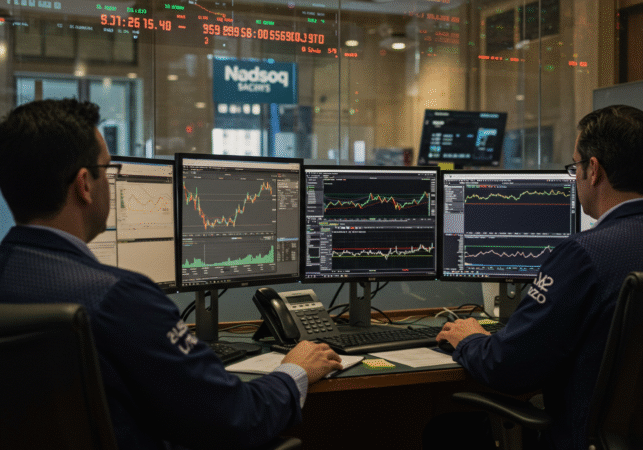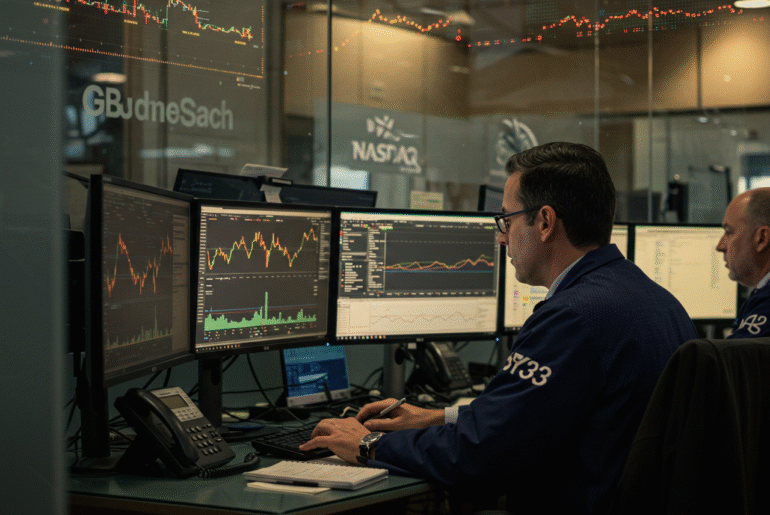This article may contain references to products or services from one or more of our advertisers or partners. We may receive compensation when you click on links to those products or services. Nonetheless, our opinions are our own.
The information presented in this article is accurate to the best of our knowledge at the time of publication. However, information is subject to change, and no guarantees are made about the continued accuracy or completeness of this content after its publication date.
- How Market Makers Influence the Financial Landscape
- The Backbone of Trading Liquidity
- How Market Makers Support Active Trading
- The Mechanics Behind Market Maker Profitability
- The Evolution of Market Making with Technology
- The Spectrum of Market Makers
- Market Makers’ Impact on Trading Experience
- Advantages and Limitations of Market Makers
- Frequently Asked Questions
- Conclusion
- Recommended Reads
How Market Makers Influence the Financial Landscape
In the intricate tapestry of financial markets, market makers quietly orchestrate the smooth exchange of assets. Their steady presence ensures that investors, whether seasoned or new, can buy or sell stocks and other securities with confidence and efficiency. Without these participants, trading could feel like stumbling through a crowded bazaar without a clear path.
The Backbone of Trading Liquidity
A market maker refers to a firm or individual that simultaneously posts buy (bid) and sell (ask) prices for a financial instrument. By constantly quoting these prices, market makers keep the stream of trading activity flowing. They step in to fulfill transactions even when a perfect match between a buyer and seller does not exist, preventing the markets from grinding to a halt.  Market makers also take on inventory risk by holding assets in their accounts. They are prepared to sell these holdings to eager buyers or purchase from willing sellers, ensuring that trading does not suffer unnecessary delays.
Market makers also take on inventory risk by holding assets in their accounts. They are prepared to sell these holdings to eager buyers or purchase from willing sellers, ensuring that trading does not suffer unnecessary delays.
How Market Makers Support Active Trading
Market makers perform several indispensable functions that benefit all participants in a trading environment. They provide liquidity, reduce transaction costs, and contribute to more stable pricing. Consider the following ways they support the trading ecosystem:
- Providing Continuous Pricing: By offering up-to-date bid and ask quotes, market makers encourage consistent activity and prevent long gaps between trades.
- Narrowing Bid-Ask Spreads: Competition among market makers pushes spreads tighter, which helps lower trading expenses for investors.
- Enabling Predictable Execution: Their readiness to buy or sell facilitates prompt order completion, even during times of elevated trading volume or market stress.
The Mechanics Behind Market Maker Profitability
Market makers earn income by capturing the bid-ask spread, the small difference between their buying and selling prices. For example, if a stock’s bid is $100.00 and its ask is $100.10, the market maker earns ten cents per share traded. Although individual spreads are often small, high volumes can generate significant revenue over time. Additionally, market makers carefully manage their inventory to avoid exposure to adverse price moves. If they accumulate too much of a security, they may face losses if its value declines. Their risk management practices are important to remaining profitable and solvent.
Voted "Best Overall Budgeting App" by Forbes and WSJ
Monarch Money helps you budget, track spending, set goals, and plan your financial future—all in one app.
Get 50% OFF your first year with code MONARCHVIP
The Evolution of Market Making with Technology
Modern market making often employs high-frequency trading algorithms. These sophisticated programs monitor market conditions, analyze patterns, and execute trades in fractions of a second. This technological edge allows market makers to maintain competitive prices and respond instantly to shifts in supply and demand, which helps sustain orderly trading even in volatile periods.
The Spectrum of Market Makers
Market makers differ based on the assets they trade, the customers they serve, and the exchanges they operate on. Below is a brief comparison of their types:
| Type | Description |
|---|---|
| Institutional Market Makers | Large firms dealing with substantial order sizes cater to institutional investors. |
| Retail Market Makers | Firms that facilitate smaller trades for individual investors make financial markets more accessible. |
| Exchange Market Makers | Participants appointed by exchanges such as Nasdaq or NYSE to maintain liquidity for listed securities. |
| Electronic Market Makers | Entities that rely heavily on advanced algorithms to quote and execute trades with minimal human intervention. |
Market Makers’ Impact on Trading Experience
Market makers play a pivotal role in shaping the trading experience for investors of all levels. They ensure that buy and sell orders are matched swiftly, which improves overall market efficiency and reduces the likelihood of dramatic price swings. Their ability to absorb large trades helps protect markets from sudden shocks that might otherwise cause extreme volatility. In addition to facilitating smoother transactions, market makers contribute to more competitive pricing by encouraging other participants to narrow their spreads. The result is a trading environment where prices more accurately reflect current supply and demand dynamics.
Advantages and Limitations of Market Makers
Market makers bring notable benefits to markets, but they also introduce potential drawbacks:
Advantages
- Consistent availability of buyers and sellers supports an active and liquid market.
- Lower transaction costs through narrower bid-ask spreads.
- Improved price stability during high-volume trading periods.
Limitations
- Market makers can face conflicts of interest, particularly if they trade on their accounts while facilitating client orders.
- In rare cases, they may engage in manipulative practices to profit from their market positioning, though regulatory oversight seeks to prevent such behavior.
Frequently Asked Questions
What is the role of a market maker in financial markets?
Market makers provide continuous buy and sell prices, enhancing liquidity and enabling trades to occur smoothly without significant price disruptions.
How do market makers earn revenue?
They generate income primarily through the bid-ask spread, capturing small margins on large volumes of trades.
What risks do market makers manage?
They manage inventory and market risk, where holding large positions can expose them to financial loss if prices move unfavorably.
How are market makers different from brokers?
Market makers trade directly with investors from their inventory, while brokers act as intermediaries, finding the best prices on behalf of clients without taking on positions themselves.
Can private investors become market makers?
It is uncommon for individual investors to serve as market makers, as it requires substantial capital, access to advanced trading systems, and registration with regulatory authorities.
How can one identify which firm is making a market in a stock?
Stock exchanges often disclose designated market makers for each security, and consistent bid-ask quotations on trading platforms can indicate active market making.
Conclusion
Market makers are foundational to well-functioning financial markets. Their commitment to quoting competitive buy and sell prices helps maintain active, efficient, and stable trading conditions. Knowing their role equips investors with insight into why trades execute smoothly and why prices reflect real-time market conditions.

Reviewed and edited by Albert Fang.
See a typo or want to suggest an edit/revision to the content? Use the contact us form to provide feedback.
At FangWallet, we value editorial integrity and open collaboration in curating quality content for readers to enjoy. Much appreciated for the assist.
Did you like our article and find it insightful? We encourage sharing the article link with family and friends to benefit as well - better yet, sharing on social media. Thank you for the support! 🍉
Article Title: What Is a Market Maker?
https://fangwallet.com/2025/07/03/what-is-a-market-maker/The FangWallet Promise
FangWallet is an editorially independent resource - founded on breaking down challenging financial concepts for anyone to understand since 2014. While we adhere to editorial integrity, note that this post may contain references to products from our partners.
The FangWallet promise is always to have your best interest in mind and be transparent and honest about the financial picture.
Become an Insider

Subscribe to get a free daily budget planner printable to help get your money on track!
Make passive money the right way. No spam.
Editorial Disclaimer: The editorial content on this page is not provided by any of the companies mentioned. The opinions expressed here are the author's alone.
The content of this website is for informational purposes only and does not represent investment advice, or an offer or solicitation to buy or sell any security, investment, or product. Investors are encouraged to do their own due diligence, and, if necessary, consult professional advising before making any investment decisions. Investing involves a high degree of risk, and financial losses may occur including the potential loss of principal.
Source Citation References:
+ Inspo
There are no additional citations or references to note for this article at this time.












































